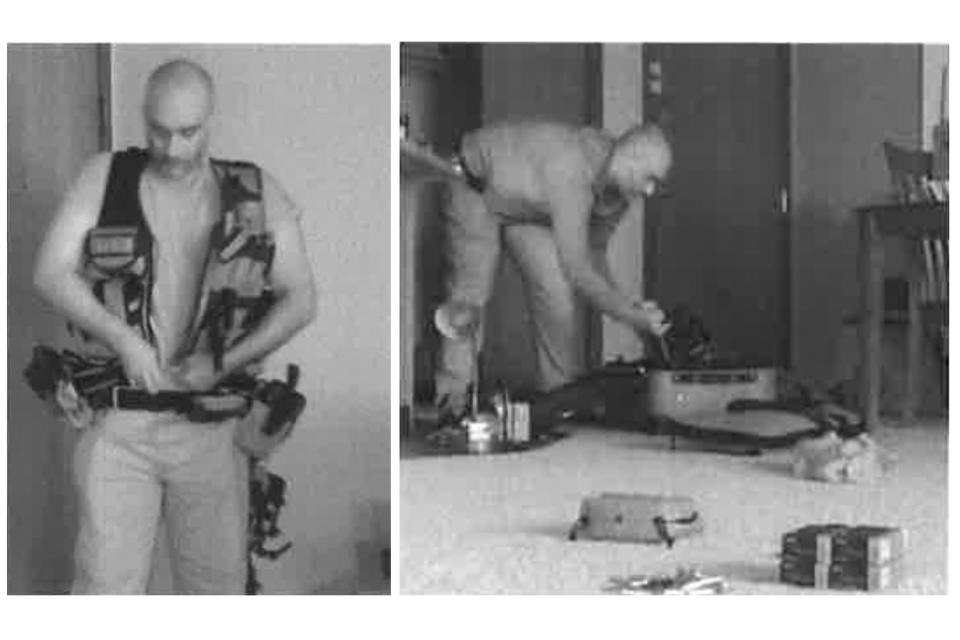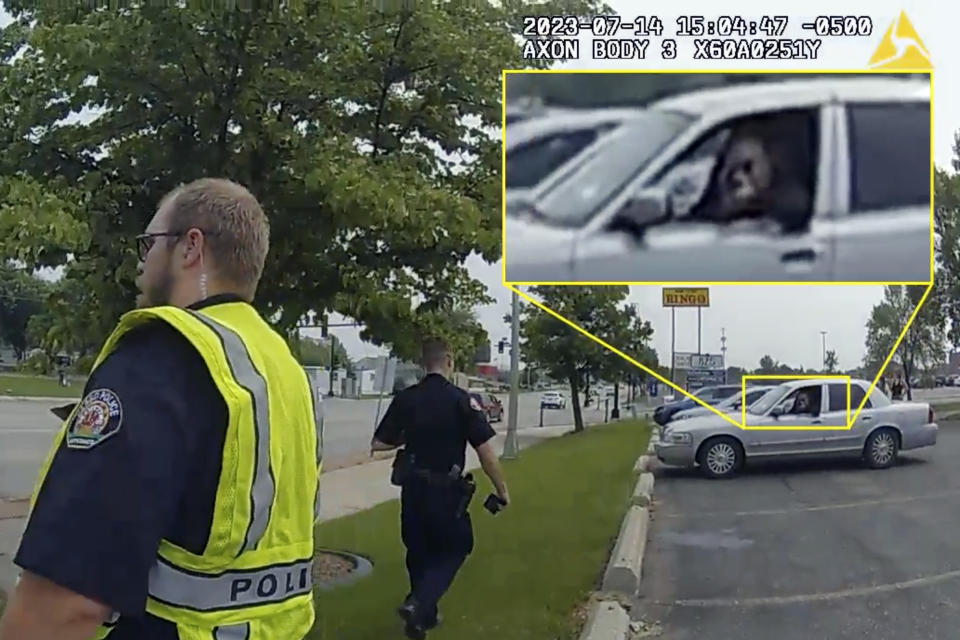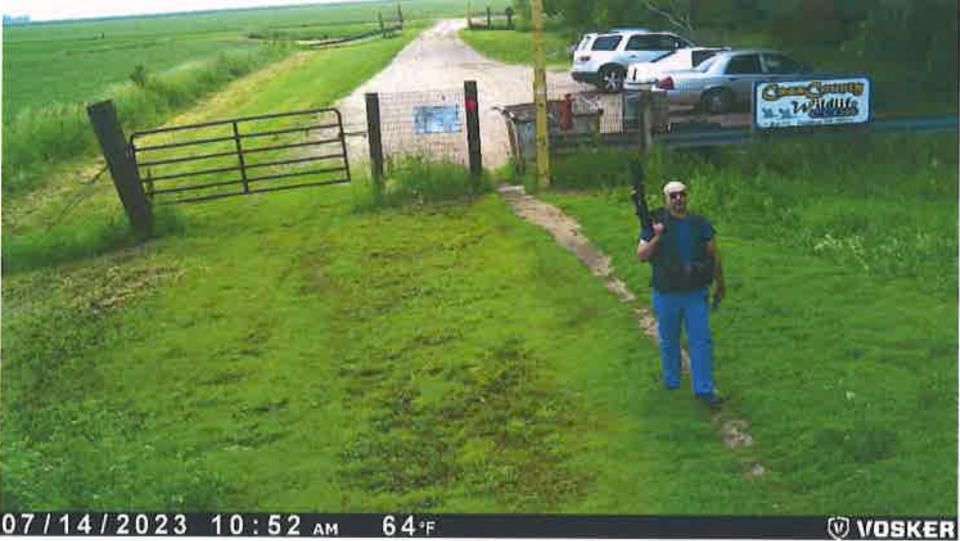Investigation reveals Fargo gunman's movements before deadly police shooting
BISMARCK, N.D. (AP) — Newly released investigative reports into last year's deadly ambush of police officers in Fargo, North Dakota, show the gunman loading his weapons into a garage and visiting a gun range hours before the attack.
The trove of documents released Thursday includes a timeline of images from Mohamed Barakat’s apartment and surveillance cameras mapping his movements before the July 14 shooting. Barakat shot and killed one Fargo police officer and wounded two other officers and a bystander before a fourth officer killed him in an exchange of gunfire. Investigators have said they believe Barakat was planning a larger attack.
North Dakota Attorney General Drew Wrigley said Friday that there was no evidence of political, racial or religious motivation in the attack.
“What you're left with is just hate and a desire to cause carnage and mayhem,” he told The Associated Press. “I can't discern, from the evidence that we have, any other motivation.”
Wrigley called Barakat “a true lone-eagle attacker who methodically put together the armaments necessary for a mass-casualty event."
Images taken from video on the night before the shooting show a tactical vest on Barakat's apartment floor, Barakat checking his door while holding a gun and a cellphone, and later assembling a short-barreled shotgun. After midnight, he’s seen holding a Quran; Wrigley said Barakat's Muslim faith isn't notable.
The next morning, the 37-year-old gunman is seen accessing trail cameras via his computer and deleting files, holding guns, donning a tactical vest and loading a suitcase before leaving home with the suitcase, a rifle case and a bag. He secured his door with a strap or cable and returned at least twice that day to check it.
Wrigley said he thinks Barakat intended to return to his apartment after the attack, citing his many weapons, ammunition and explosives. The sling on Barakat's door and the camera inside his apartment indicate he wanted to know if anybody had been there, and the cable on the door would let him know if it had been opened, Wrigley said. Barakat had cameras in his apartment and garage.
Barakat spent about 20 minutes at a nearby gun range that day, then bought gasoline and cigarettes at a nearby convenience store and a beverage at a dollar store, the documents show.
After that, he drove around Fargo, returning several times to his garage and at least twice to his apartment. He loaded gas cans into his car, drove off again, then returned to his apartment building, where he argued with a manager at the front door. The timeline doesn't detail the argument.
After Barakat left his garage for the last time, he drove near the site of a fender bender on a busy street. Wrigley said he watched, waited for and targeted the responding officers.
Wrigley has already released or shown videos from the officers' body cameras, a police car dashboard camera and a nearby business showing Barakat driving near the crash scene before parking and opening fire.
Barakat shot and killed 23-year-old Officer Jake Wallin — who fired one round before he died — and wounded Officers Andrew Dotas and Tyler Hawes. A driver who had rear-ended another vehicle was also wounded.
Barakat waited until the officers moved closer to him before he opened fire from his vehicle with no apparent warning. He used a .223-caliber rifle that was modified with a binary trigger to unleash a torrent of bullets, some of which hit passing cars and nearby homes.
A fourth officer, Zach Robinson, fired back with a 9 mm handgun, shooting the clip of Barakat's rifle and effectively disabling it. Robinson called for backup then ran toward danger as Barakat moved between parked cars.
The video shows the wounded Barakat on the ground, ignoring Robinson's commands to drop his weapon. Robinson fired five more shots. After nearly two minutes, 21 of the 31 shots Robinson fired had struck the gunman.
The investigative files included photos taken of Barakat’s car showing blood stains and bullet holes, but also the arsenal he brought with him. The photos show more than a dozen spent shell casings that landed on the driver’s side floor and in the windshield and heating vent of his car. They also show gas cannisters and another long gun in the backseat, a propane tank in the passenger seat, and another propane tank and gasoline canister in the trunk.
A search warrant indicates authorities were looking for “manifestos or writings" about planning of the attack, but it doesn’t say if investigators found anything like that.
Investigators found 1,800 rounds of ammunition and a homemade grenade. Other items found in Barakat’s vehicle include images of a Powerpuff Girl and horror movie villain Michael Myers, made from fuse beads. There were also several knives, lighter fluid, a two-pound tub of Tannerite — used for exploding targets — two handguns with ammunition and 25 loose extra clips of bullets, as well as vests loaded with additional clips of ammunition.
Barakat was a Syrian national who sought asylum in the U.S. in 2012 and became a U.S. citizen in 2019, Wrigley said. Concerns about his collection of at least 10 guns and 6,000 rounds of ammunition prompted police to interview Barakat at least twice, but they deduced he had acquired the weapons legally.
Barakat lived alone and worked odd jobs for money. He had no criminal record or social media presence.
After the attack, investigators examining Barakat’s internet history found that over the past five years, he had searched for terms including “kill fast,” “explosive ammo,” “incendiary rounds,” and “mass shooting events.” The day before the shooting, he searched for “area events where there are crowds,” which brought up a news article with the headline, ”Thousands enjoy first day of Downtown Fargo Street Fair.”
A volunteer at a Fargo-area indoor shooting range told an investigator that no red flags were raised during his several conversations with Barakat.
“Part of our volunteer training is kinda the ‘see something, say something' type training," volunteer Craig Dockter said. “If something just tickles the hair on the back of our neck about somebody, we bring it up to a manager ... but I never got that from him."
A 2016 Cass County Sheriff's Office report show Barakat voluntarily turned over two rifles and two shotguns because he didn't want anyone to think he is violent, given he is a Muslim from Syria. He told deputies he “never really could get into the shooting sports and that the current state of affairs in the world convinced him that he should dispose of the guns," according to the report.
___
Associated Press reporter Claudia Lauer in Philadelphia contributed to this report.

 Yahoo News
Yahoo News 


